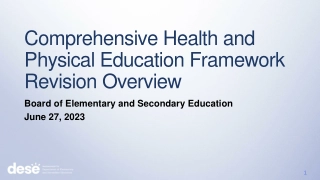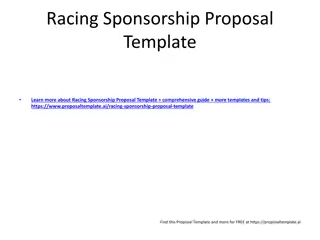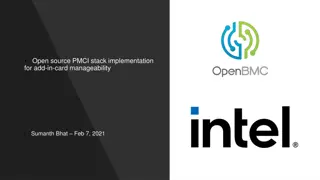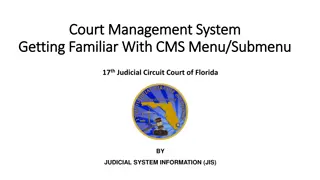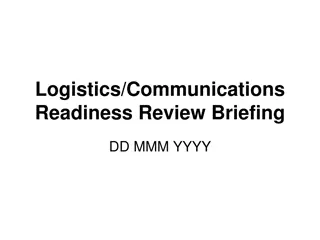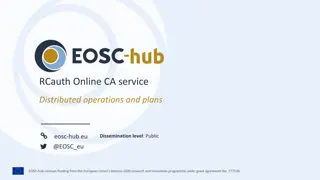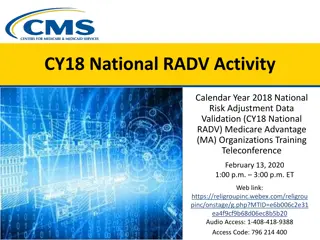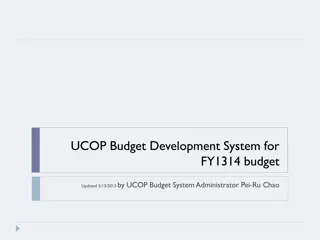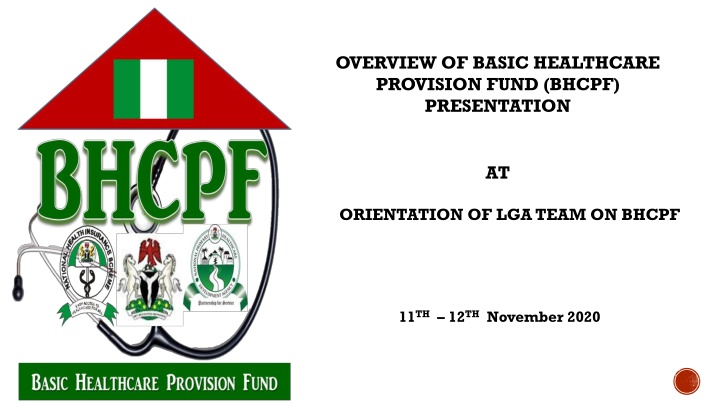
Overview of Basic Healthcare Provision Fund and Universal Health Coverage
"Learn about Nigeria's commitment to Universal Health Coverage through the Basic Healthcare Provision Fund, including the National Health Act, key objectives of UHC, and the importance of access to quality healthcare services without financial hardship."
Download Presentation

Please find below an Image/Link to download the presentation.
The content on the website is provided AS IS for your information and personal use only. It may not be sold, licensed, or shared on other websites without obtaining consent from the author. If you encounter any issues during the download, it is possible that the publisher has removed the file from their server.
You are allowed to download the files provided on this website for personal or commercial use, subject to the condition that they are used lawfully. All files are the property of their respective owners.
The content on the website is provided AS IS for your information and personal use only. It may not be sold, licensed, or shared on other websites without obtaining consent from the author.
E N D
Presentation Transcript
OVERVIEW OF BASIC HEALTHCARE PROVISION FUND (BHCPF) PRESENTATION AT ORIENTATION OF LGA TEAM ON BHCPF 11TH 12TH November 2020
OUTLINES Introduction Universal Health Coverage National Health Act as a legal Framework Basic Health Care Provision Fund (BHCPF) Healthcare Provider Rights and Responsibilities under BHCPF LGHA Support to PHC Facilities Non- Governmental Organizations (NGOs) and Civil Society Organizations (CSO) Transparency and Accountability Reward and Sanction Fraud Conclusion
INTRODUCTION Nigeria s commitment to UHC has been symbolized by the passage of the National Health Act of 2014, which in section 11 mandates the establishment of a Basic Health Care Provision Fund (BHCPF); to support the effective delivery of primary and secondary healthcare services through the provision of a Basic Minimum Package of Healthcare Services (BMPHS) and Emergency Medical Treatment (EMT) to all Nigerians. The National Health Act (NHAct) 2014 is a milestone in the National momentum to strengthen Nigeria s health system, achieve Universal Health Coverage (UHC), and improve the Nation s Health indices with the consequential improvement in economic productivity.
UNIVERSAL HEALTH COVERAGE (UHC) UHC is a global initiative that seeks to make health services available to everyone. All people and communities can use the promotive, preventive, curative, rehabilitative and palliative health services they need, of enough quality to be effective, while also ensuring that the use of these services does not expose the user to financial hardship. It is firmly based on the WHO constitution of 1948 declaring health a fundamental human right and on the Health for All agenda set by the Alma Ata declaration in 1978. UHC cuts across all the health-related Sustainable Development Goals and brings hope of better health and protection for the world s poorest.
UNIVERSAL HEALTH COVERAGE (UHC):CONTD The key objectives of UHC include: Equity in access to health services- everyone who needs services should get them, not only those who can pay for them; The quality of health services should be good enough to improve the health of those receiving services; and People should be protected against financial risk, ensuring that the cost of using services does not put people are risk of financial harm.
THE NATIONAL HEALTH ACT 2014 The NHAct 2014 is passed by the FGON to protect, promote and fulfill the rights of the people of Nigeria to have access to health services. The National Health Act provides a framework for the regulation, development and management of a National Health System and set standards for rendering health services in the Federation; The Act supports the effective delivery of primary health care services through the provision of a basic minimum package of health services and emergency medical treatment to all Nigerians.
THE NATIONAL HEALTH ACT 2014 The NHA 2014 has seven(7) parts and Sixty five sections(65) All the building blocks of the health system are highlighted in the sections of the Act. Part One, Section eleven of the Act establishes a Basic Health Care Provision Fund (BHCPF) also known as the Fund
BASIC HEALTH CARE PROVISION FUND (BHCPF) The Basic Health Care Provision Fund (BHCPF or The Fund ) is established under Section 11 of the National Health Act (NHA Act 2014), as the principal funding vehicle for the Basic Minimum Package of Health Services (BMPHS) The Fund serves to increase the fiscal space and overall financing to the health sector to assist Nigeria achieve Universal Health Coverage (UHC).
TARGET GROUP This refers to the following categories of people: pregnant women, children under five (5) years the elderly >85 years, the disabled, the poor and Vulnerable
AIM OF THE BHCPF To significantly move Nigeria towards achieving Universal Health Coverage (UHC) based on the current National Strategic Health Development Plan II (2018 2022) in the medium term; and the long-term goals for UHC including the health-related SDG Goals. To within the next three years, meet the NSHDP targets 1 2 3 Reduce MMR from 576 to 400 per 100,000 live births (31%) Reduce NMR from 39 to 26 per 1000 live births (33%) Reduce U5MR from 120 to 85 per 1000 live births (29%)
PURPOSE OF BHCPF Ensuring the provision of a basic minimum package of health services to all Nigerians through the National Health Insurance Scheme (NHIS) with 50% of BHCPF Strengthening the Primary Health Care (PHC) system through the National Development Agency (NPHCDA) with 45% of BHCPF Providing Emergency Medical Treatment - with 5% of the BHCPF to be administered by the National Emergency Medical Treatment Committee (NEMTC) Primary Health Care
SPECIFIC OBJECTIVES OF IMPLEMENTING THE BHCPF To achieve at least one (1) fully functional public and private PHC facilities in at least 30% of wards in next 3 years, 70% within 5 years and in all wards within 7 years. To achieve at least three (3) fully functional public/private secondary healthcare facilities, benefitting from the BHCPF in at least 50% of states within the next 3 years and all within the next 5 years. To establish an effective emergency medical response services in 36 states and FCT in 5 years including a national ambulance service for Nigeria. To reduce out of pocket expenditure by 30% in 5 years and increase financial risk protection for all Nigerians through health insurance. To increase life expectancy to at least 60 years for males and females over the next decade.
SPECIFIC OBJECTIVES OF BHCPF To have 3 functional P/P SHF in: At least 50% o states within 3 years All states in the next 5 years To establish effective medical response Services in 36 states & FCT in 5 years. SHF EMR services To have 1 functional PHF in: 30% of wards in 3 years 70% of wards in 5 years All wards in 7 years. To reduce OOPE by 30% in 5 years Increase financial risk protection for all Nigerians through insurance PHC OOP E Objectives Increase to at least 60 years over the next decade life expectancy
THE GUIDING PRINCIPLES TO IMPLEMENT THE BHCPF Population Coverage: The BHCPF shall focus on provision of BMPHS for all citizens in line with the NHAct 2014. Service Provision: Provision of healthcare services within the BHCPF shall be by Primary and Secondary Health Care facilities duly registered by the Ministries of Health in the states (SMOH) and FCT; and in possession of a Certificate of Standards. In collaboration with the state agencies, and endorsement of the state s Commissioner for health, both public and private primary and secondary healthcare facilities and emergency services providers, shall be identified to serve as service delivery points Scope of services: This is based on the Basic Minimum Package of Healthcare Services (BMPHS) as defined by the Honourable Minister of Health in line with the NHAct 2014.
THE GUIDING PRINCIPLES TO IMPLEMENT THE BHCPF:CONTD Fund Flow: Funds will be transferred from the Consolidated Federation Revenue Fund Account by the Federal Ministry of Finance to the three Gateways (NHIS, NPHCDA, and NEMTC). These Gateways will in turn allocate the funds to the States (SSHIA, SPHCB/A, SEMTC, health facilities and emergency services providers) for the delivery of various primary and secondary health services in the BMPHS. Enrolment: Enrolment activities shall be conducted by the States and FCT Health Insurance Agencies and the NHIS to ensure the validity of data gathered. Monitoring and Evaluation: There shall be routine monitoring and periodic evaluation of activities related to the Fund by the respective Gateways i.e. NHIS, NPHCDA and NEMTC and their state counterparts. Reports of implementation (programmatic and financial), will include successes, challenges and limitations for all the proposed activities as planned in the initial proposals
OPERATIONALIZING PROVISIONS OF THE ACT Wide stakeholder consultations done A governance & administrative structure to operationalize the BHCPF Development of an operations manual for the disbursement and administration of the fund A funds flow mechanism to ensure accountability and transparency
SOURCES OF FINANCE FOR THE BHCPF 1) Federal Government annual grant of not less than one per cent of its Consolidated Revenue Fund (CRF); Funds from any other source 2) Grants from Donor/Partners and (WB, DFID, USAID, BMGF) Grants by International Donor Partners 3) Fund from any other source. 1% Consolidated Revenue Fund
GOVERNANCE AND ADMINSTRATION OF FUNDS To ensure the achievement of the goals and objectives of the fund, a governance and administration mechanism is established at the national / federal, states and facility level. There are three hierarchies of governance and three hierarchies of administration for the BHCPF
GOVERNANCE STRUCTURE 1. National/Federal: a. The National Council on Health b. The Ministerial Oversight Committee for the BHCPF State: a. State Oversight Committees 3. LGA/Facility: a. Local Government Health Authorities b. Ward Development Committees
ADMINISTRATION STRUCTURE 1. Federal: a. NHIS (NHIS gateway) b. NPHCDA (NPHCDA gateway) c. National Emergency Medical Treatment Committee 2. State: a. SPHCDA b. SSHIA c. SEMTC 3. Facility: a. PHCFs b. SHCFs c. Emergency medical treatment service providers
ROLES AND RESPONSIBILITIES OF STAKEHOLDERS IN BHCPF
NATIONAL COUNCIL ON HEALTH (NCH) The National Council on Health (NCH), as established by National Health Act 2014 (Sections 4), is the highest policy making body in Nigeria on matters relating to health and it has oversight responsibility for the BHCPF. Specifically, among other responsibilities the NCH shall:
ROLES OF NCH Have responsibility for the protection, promotion, improvement and maintenance of the health of the citizens of Nigeria and the formulation of enabling policies and prescription of measures necessary to achieve national health goals and priorities. Ensure the delivery of basic healthcare services to the people of Nigeria and prioritize other healthcare services that may be provided within available resources.
MINISTERIAL OVERSIGHT COMMITTEE FOR THE BHCPF(MOC- BHCPF) Committee to be chaired by the Honourable Minister of Health Function as a national oversight group promoting true collaboration among implementing agencies in the evolution and implementation of the BHCPF Coordinate the operations of the various stakeholders to ensure alignment with the overall objectives of the NHAct for BHCPF. Review for endorsement annual work plans and budgets of Federal and State implementing entities as presented by implementing agencies. Review updates on funds flow, performance management and verification of results, as presented by the implementing Agencies for feedback and guidance by the MOC.
(MOC- BHCPF):CONTD programme Evaluate implementing agencies (NPHCDA, NHIS and EMT). Have the responsibility to ensure compliance of all participating agencies and entities with the Operations Manual. Review performance of the implementing entities based on a clear set of agreed upon Key Performance Indicators (KPIs) across the programme. Ensure that monies have been disbursed, managed, and accounted for in a transparent manner and in accordance with the Operations Manual. Advocate and ensure the provision of the required resources for planning and delivery of the programme. periodic report presented by the
(MOC- BHCPF):CONTD Facilitate implementation of financial audits by external auditors. In exceptional circumstances, where the Honourable Minister may consider an independent report to be required, the MOC may direct the engagement of an independent entity to review programme implementation on a case-by-case basis. Prepare progress report to the NCH, NEC, NASS and other stakeholders as may be required from time to time. Resolve disputes or issues arising from implementation of the BHCPF. Meetings of the MOC-BHCPF The MOC-BHCPF shall meet quarterly, or at the instance of the Honourable Minister.
MEMBERSHIP FOR MOC-BHCPF The Minister for Health as Chairman Minister of State for Health as Alternate Chair Permanent Secretary Federal Ministry of Health (FMOH) as Vice Chair and in the absence of either the Minister of Health or the Minister of State for Health shall assume Chair of the Oversight Committee One representative of the Minister of Finance Executive Secretary NHIS Executive Director NPHCDA Chair of NEMTC Director Family Health of FMOH Director Public Health of FMOH
MEMBERSHIP FOR MOC-BHCPF Director Planning, Research and Statistics of FMOH Director Hospital Services of FMOH Chair of the Committee of State Commissioners of Health One Representative/Chairperson of SPHCDB Executive Secretaries One Representative/Chairperson SSHIA Executive Secretaries One (1) Representative each of Development Partners and Private Sector Organizations contributing to the fund One (1) Representative of WHO One (1) Representative of healthcare focused civil society organizations (CSOs) selected by CSOs. One (1) Representative of Consumer Protection Council The Secretary of the MOC shall be a Director of the FMOH in the HONOURABLE MINISTER OF HEALTH s office and a non-voting member.
STATE OVERSIGHT COMMITTEE FOR BHCPF (SOC- BHCPF) Committee chaired by the Honourable Commissioner. Honourable Commissioner supported by the SOC shall conduct required advocacy and ensure budgetary appropriation and release of State and LGA 25% counterpart funding and any additional funding from other sources pursuant to the NHAct 2014. Ensure that all onboarding criteria as required by the Gateways are met and in a timely manner. Ensure that implementation and use of funds within the state comply with this Guideline, in a transparent and accountable manner. Receive and review annual workplans and budgets from implementing Gateways. Receive quarterly briefing from all the Gateways at the State level on programme performance, implementation & coverage. fund utilization, program
(SOC- BHCPF): CONTD Provide feedback to Gateways for strengthening implementation. Coordinate operations of different stakeholders and resolve disputes or issues arising from implementation of the BHCPF that could not be resolved by the implementing Gateways within the state. Ensure compliance Conduct periodic performance management, monitoring and supervision of activities of the Gateways within the state.
MEMBERSHIP OF STATE OVERSIGHT COMMITTEE OF BHCPF (SOC- BHCPF) Honorable Commissioner of Health Permanent Secretary SMOH Executive Secretary SPHCB/A Executive Secretary/CEO SSHIA Chairman SEMTC Directors of State Ministry of Health (RMNCH, PRS, Public Health, Hospital Services) Representative of State Ministry of Finance
MEMBERSHIP OF STATE OVERSIGHT COMMITTEE OF BHCPF (SOC-BHCPF) Representative of Ministry of Local Government and Chieftaincy Affairs State Coordinator NPHCDA State Coordinator NHIS One (1) Representative of CBOs/CSOs Representatives of Development Partners active in state. A representative of LGA PHC Coordinators Representative of Secondary Health Facilities (HMB/CMD/CEO/Head)
GATEWAYS FORUM There shall be a Gateways Forum at national and state levels for interaction of the three (3) implementing Gateways i.e. the NPHCDA, NHIS and NEMTC. The Forum shall be co-chaired by the Chief Executives of the various Gateways. Fundamental objectives of the Forum shall be: To ensure synergy, alignment and enable effective collaboration while implementing the BHCPF. Address common challenges to the implementation of the BHCPF Enable leveraging of existing institutional resources for the implementation of the Gateways. The Forum would meet at least quarterly; attended by a minimum of 3 representatives from each Gateway.
LGA PHC ADVISORY COMMITTEE This committee is a statutory committee of the LGA and exists as an integral part of the Primary Health Care Under One Roof (PHCUOR) and Ward Health System (WHS). It s composition and functions are as stated in the WHS documents (NPHCDA 2018 and 2020 as revised). In addition to its statutory function, the following will be required as part of implementation of the BHCPF, within the LGA. Advocate & mobilize resources for 25% counterpart funding in cash or kind by the LGA as required by the NHAct 2014. Ensure that health facilities are ready for NHIS/NPHCDA accreditation by providing technical support to the facilities. Ensure LGA budgetary allocation for supportive supervision, monitoring and mentoring
LOCAL GOVERNMENT SUPPORT TO PRIMARY HEALTHCARE FACILITIES Trained LGHA staff would be assigned to benefitting PHC facilities as mentors. They would supervise, support plan development, periodically check fund management Be responsible for timely transmission of plans for approval and expenditure statement. On receipt of Quarterly Business Plans, the LGHA having been integral to their development would endorse and forward copies with a covering summary sheet to the SPHCB/A for approval. The SPHCB would be responsible for technical and operational support to the LGHA to effectively execute its role.
HEALTHCARE PROVIDER RIGHTS AND RESPONSIBILITIES UNDER BHCPF To be eligible and receive payment in this initiative, each healthcare provider shall be empaneled by the NHIS/SSHIA To ensure a consistent level of quality, each facility shall meet the minimum criteria of quality standards in line with sections 12 and 13 of the NHAct 2014, before it is eligible to be fully accredited by the NHIS. Selection and continued participation in the initiative is contingent on the healthcare provider maintaining adequate quality standards of care.
PRIMARY HEALTHCARE CENTRES (PHCS) Primary Healthcare Centres (PHCs) shall be the first point of contact for patients who are seeking and receiving care from accredited providers under this initiative. PHCs shall provide the essential preventive, curative and rehabilitative healthcare services offered in the BMPHS Be enlisted into the NHIS gateway to deliver the BMPHS and be reimbursed via the NHIS Gateway via Global Payments (GP) disbursed from the Fund through SSHIAs. Have functional bank accounts with signatories including the OIC and the Chairman of the WDC Receive quarterly, and in advance direct electronic fund transfers from the SPHCDA as operational budgets. Use funds for improving commodity availability, ensuring facility functionality and generate demand through community outreaches in line with their quality improvement plans.
PRIMARY HEALTHCARE CENTRES (PHCS):CONTD Produce and submit Income and Expenditure Statements for monies received from the Fund, to the SPHCDA through the LGHA at the end of each quarter and end of the financial year. Private facilities may be contracted by the SSHIA to complement the activities of the public PHCs, The private PHCs shall not receive operating budgetary support from the SPHCDA. Fix signage indicating that BMPHS is provided at no cost to beneficiaries. Establish minimum of 2 committees with verifiable evidence of functioning viz-a- viz meetings, staff awareness and demonstrable outputs. These committees are: i. Facility management committee comprising of the officer-in-charge (as chairperson) and the unit heads/heads of departments . Produce and submit Income and Expenditure Statements for monies received from the Fund, to the SPHCDA through the LGHA at the end of each quarter and end of the financial year.
SECONDARY HEALTH CARE (SHC) FACILITIES Public and private Secondary Health Care (SHC) facilities shall provide specialist services to patients on referral from the participating public and private PHCs. Accreditation of SHC facilities shall be specialty specific and focused on specialist capability. Patients can only access SHC specialists through a written referral from their PHC provider. SHC facilities, which meet the accreditation criteria set out by the BHCPF shall only receive funding through the NHIS Gateway as Global Payments (GP) disbursed directly through the SSHIAs. SHC facilities shall be paid retrospectively following claims submission and processing.
LOCAL GOVERNMENT SUPPORT TO PRIMARY HEALTHCARE FACILITIES Trained LGHA staff would be assigned to benefitting PHC facilities as mentors. They would supervise, support plan development, periodically check fund management Be responsible for timely transmission of plans for approval and expenditure statement. On receipt of Quarterly Business Plans, the LGHA having been integral to their development would endorse and forward copies with a covering summary sheet to the SPHCB/A for approval. The SPHCB would be responsible for technical and operational support to the LGHA to effectively execute its role.
NON- GOVERNMENTAL ORGANIZATIONS (NGOS) AND CIVIL SOCIETY ORGANIZATIONS (CSO) NGOs and CSO shall continue to play their role of promoting social accountability as it relates to the implementation of the BHCPF. The CSO representative on the Ministerial Oversight Committee of the BHCPF shall document and periodically consult with NGOs and CSO with specific interest in the programme implementation. Through specific pre-agreed engagement frameworks, CSOs shall notify the various Gateways, the Honourable Minister or Commissioner for Health as appropriate, of their concerns, observations and findings. CSOs may similarly make their finding and reports public after submitting same to the relevant Gateway and providing ample time for clarifications and response as stipulated in their engagement framework.
NON- GOVERNMENTAL ORGANIZATIONS (NGOS) AND CIVIL SOCIETY ORGANIZATIONS (CSO):CONTD NGOs and CSOs may choose to engage in programme monitoring, supervision based on their organizational mandates. Such organizations may provide financial or technical support at various levels of implementation and with appropriate clearance from the most relevant authority at their level of operations. Gateways shall be open to NGOs and CSOs participation in programme activities such as capacity building, surveys etc. based on their core competencies and engagement framework. Such participation shall, however, not place additional financial obligation on the Gateways
TRANSPARANCY AND ACCOUNTABILITY The use of TSA is expected to enhance transparency as it can be viewed Nationally, by all authorized persons. The implementing institutions for the various Gateways shall endeavor to routinely communicate fund receipt, disbursements, and utilization to the public. The Gateways would implement an accountability framework that would hold responsible persons and institutions at all levels accountable for inactions and misconducts that threaten programme success. The Gateways are expected to further drill down and expatiate on this framework for interventions peculiar to the various Gateways., for routine implementation.
REWARD AND SANCTION Specific rewards and sanctions for each aspect of the accountability framework/s would be Gateway based; and guided by consensus reached with stakeholders to ensure compliance. As an over-arching principle, all rewards and sanction would not contravene the public civil service rules and regulations, public financial regulations and the national Procurement Act. For private sector entities, particularly for the NHIS and EMT Gateways, extant federal and state laws shall apply as relevant, for financial matters.
FRAUD Any inability to account for funds which have been transferred, or irreconcilable through bank statements or payment orders, or invoices etc for the expenditure of the said funds; would be subject to investigative audit. Where fraud is detected from embezzlement or outright diversion of funds for purposes not linked and approved for the BHCPF, shall be made to relevant antigraft agencies for appropriate investigations and prosecution. All levels of implementation, be it health facility, LGA, State, or National level may be held liable for fraud and fraudulent practices.
CONCLUSION BHCPF are earmarked Funds to cover the socially excluded informal sector population using the platform of the SSHIA A veritable tool to accelerate Nigerians movement towards UHC

![❤[READ]❤ Deep Space Craft: An Overview of Interplanetary Flight (Springer Praxis](/thumb/21511/read-deep-space-craft-an-overview-of-interplanetary-flight-springer-praxis.jpg)


